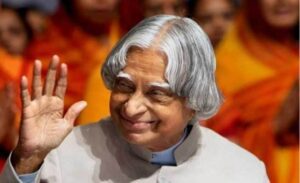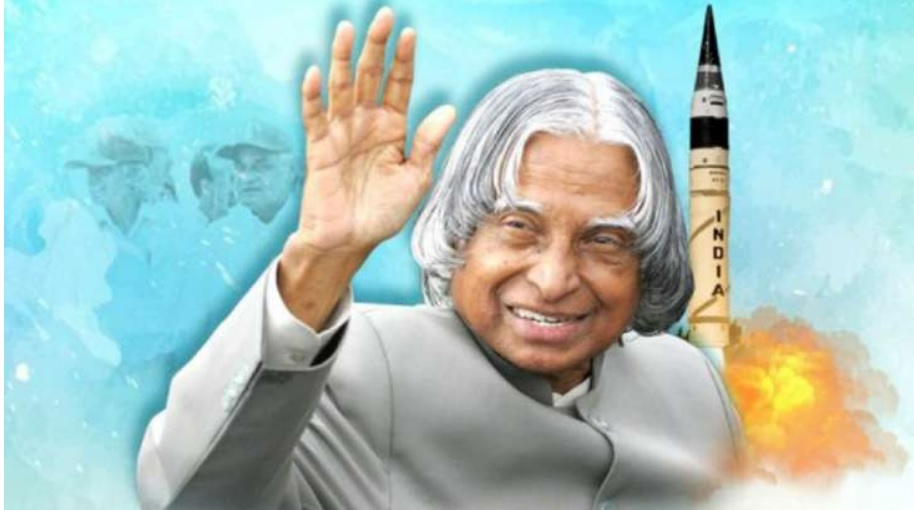Avul Pakir Jainulabdeen Abdul Kalam (15 October 1931 – 27 July 2015) was an Indian scientist who served as the 11th President of India from 2002 to 2007. He was a professor of aerospace engineering at the Indian Institute of Technology (IIT) Madras, and a professor of aerospace engineering at the Indian Institute of Management (IIM) Ahmedabad. He was also a respected scientist in the Indian Space Research Organisation (ISRO).
Dr. A.P.J. Abdul Kalam was the first scientist to become the President of India. He served in the office from 2002-2007.
Kalam was born and raised in a Tamil Muslim family in the coastal town of Rameswaram in Tamil Nadu. He was the youngest of five siblings. His father, Jainulabudeen, was a boat owner and imam of a local mosque; his mother, Ashiamma, was a housewife. Kalam’s father owned a ferry that took Hindu pilgrims back and forth between Rameswaram and the now-uninhabited Dhanushkodi. Kalam’s experience in the boat business gave him a deep insight into the hardships of people living in the coastal areas and instilled in him a desire to serve the nation.

Education
Kalam’s early schooling was in Rameswaram, where he attended the Schwartz Higher Secondary School. He then attended St. Joseph’s College, Tiruchirappalli, and graduated with a degree in physics from the Madras Institute of Technology in 1960. After completing his degree, he joined the Aeronautical Development Establishment of the Defence Research and Development Organisation (DRDO) as a scientist. His work on the SLV-III project made him known as the “Missile Man of India”.
Read more: Draupadi Murmu: Biography, Education, Political Career, Networth & More

Career
In 1969, Kalam was transferred to the Indian Space Research Organisation (ISRO) where he was the project director of India’s first indigenous Satellite Launch Vehicle (SLV-III). He was also the Chief Executive of the Integrated Guided Missile Development Programme (IGMDP).
Kalam was awarded the Padma Bhushan in 1981 and the Bharat Ratna in 1997 for his contributions to the field of science and technology. He was also a recipient of several honorary doctorates, including an honorary doctorate from the Indian Institute of Science, Bangalore, and the Jawaharlal Nehru Technological University, Hyderabad.
Aerospace Engineering

He studied Physics and Aerospace Engineering at the Madras Institute of Technology and went on to become a scientist at the country’s defense research and development organization, the DRDO. He is best known for his work as an aerospace engineer and his contributions to the field of missile technology and nuclear weapons development. Kalam was one of the key figures behind India’s successful first test of a nuclear weapon in 1998. In addition to his work in aerospace engineering, Kalam was also an active proponent of science and technology education in India.
He spearheaded the development of the Indian Institute of Technology, and was widely known for his public lectures on science education, which he delivered to students of all ages across the country. He also authored several books on the importance of science and technology in modern society. Kalam’s legacy as an engineer and scientist is one of innovation, dedication and a commitment to the advancement of India. He is remembered as a great leader and an inspirational figure who helped shape India’s modern technological landscape.
What did Dr. A.P.J. Abdul Kalam accomplish during his lifetime?
Dr. A.P.J. Abdul Kalam was an Indian aerospace scientist, who served as the 11th President of India from 2002 to 2007. During his lifetime, he worked as an aerospace engineer with the Indian Space Research Organisation (ISRO), where he was the project director of India’s first indigenous Satellite Launch Vehicle (SLV-III). He also made significant contributions to India’s civilian space program and military missile development programs. His notable achievements include the successful launch of the Agni missile and the development of the Polar Satellite Launch Vehicle (PSLV) and the Geosynchronous Satellite Launch Vehicle (GSLV). He was also awarded the Bharat Ratna, India’s highest civilian honour, for his contributions to the field of science and technology.
Kalam was a pacifist and believed in peace, non-violence, and harmony. He was an avid reader and was deeply interested in music, literature, and history. He was a strong advocate of education and believed that education should be made accessible to all. He was an inspirational figure to the youth of India, and was known as the “People’s President”. He wrote several books, including the autobiography Wings of Fire and the book India 2020, which outlines a vision for the future of India.
Death

Kalam passed away in 2015 due to cardiac arrest. He was posthumously honored with the Bharat Ratna, India’s highest civilian award. His funeral was attended by numerous dignitaries from all over the world, including the then-President of India, Pranab Mukherjee. He is remembered as one of the greatest scientists in India and a true patriot.
Dr. A.P.J. Kalam Biography.pdf
Some Interesting Facts about Dr. A P J Abdul Kalam
- Dr. A P J Abdul Kalam was born on October 15, 1931 in Rameswaram, Tamil Nadu in India.
- He was a great scientist and the 11th President of India from 2002 to 2007.
- He was an aerospace engineer and was popularly known as the “Missile Man of India” for his work on the development of ballistic missile and launch vehicle technology.
- He was awarded the Bharat Ratna, India’s highest civilian honor in 1997.
- He was the first person to receive honorary doctorates from 30 universities and institutions.
- He wrote several inspirational books, such as Wings of Fire, Ignited Minds, My Journey and India 2020.
- He was an avid reader and an inspirational speaker, who gave motivational lectures to school and college students throughout India.
- He passed away on 27th July, 2015 in Shillong, Meghalaya.
Read More: Biography Of Dr. Ambedkar

